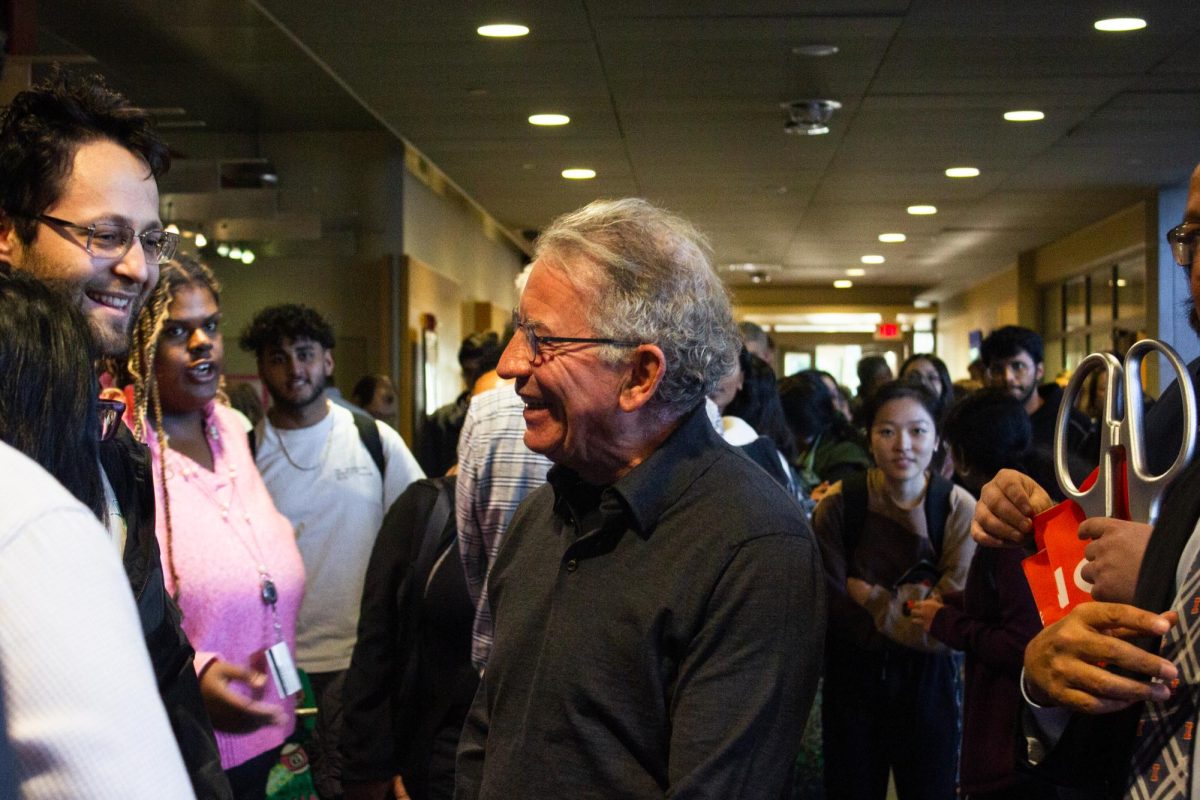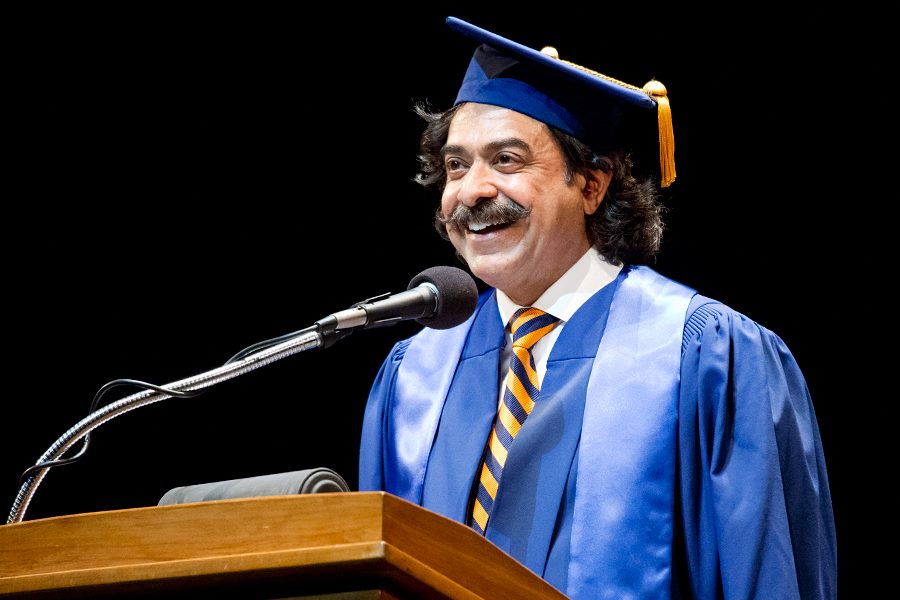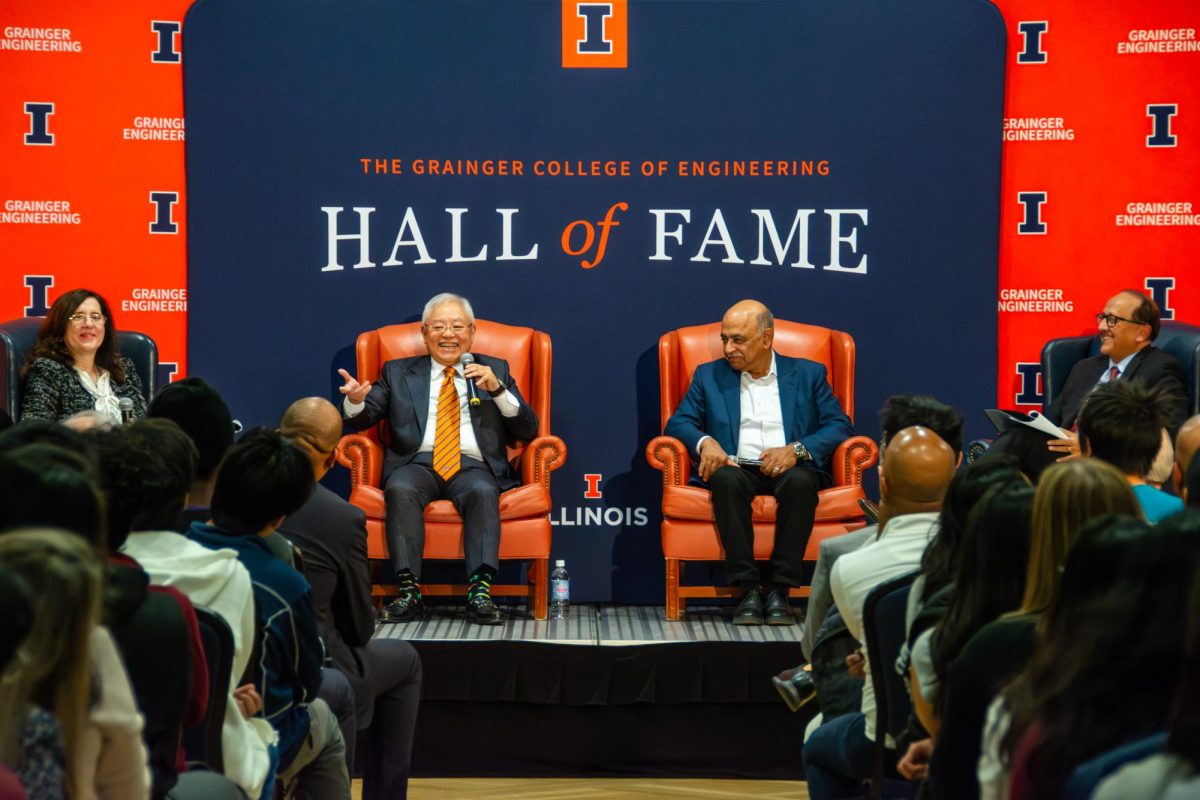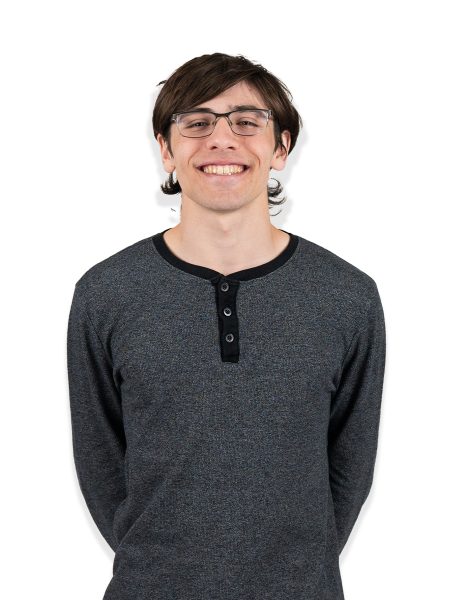The University held a dedication event Friday for the Siebel School of Computing and Data Science, a building made possible by a $50 million endowment from alumnus Thomas Siebel.
The dedication ceremony, held at the National Center for Supercomputing Applications, included remarks from Siebel, Chancellor Robert J. Jones and University of Illinois System President Timothy Killeen, along with other University leaders, followed by a “fireside chat’’ between Siebel and the dean of the Grainger College of Engineering, Rashid Bashir.
Siebel, who received his bachelor’s degree in history from the University in 1975 and later returned for master’s degrees in business and computer science, is the founder and CEO of C3.ai, a leading enterprise AI software company.
In the 1990s, he founded Siebel Systems, a company that became a global leader in enterprise software before being acquired by Oracle Corporation in 2006, which is the third-largest software company by revenue globally. Siebel went on to create C3.ai in 2009.
Siebel sits on the board of advisors for the engineering colleges at Stanford University, the University of California, Berkeley as well as the University. His latest contribution to the University is part of a long list of prior donations and gifts, which includes over $200 million for various professorships, buildings and educational initiatives.
Get The Daily Illini in your inbox!
Bashir began the ceremony by emphasizing the importance of computing and data science as a crucial aspect of engineering. He also said that the school has a goal of spreading the subjects to other parts of campus to engage in interdisciplinary research and instruction.
“This new school represents the evolution of computing and data science as the third pillar of engineering,” Bashir said, referring to math and physics as the first two. “Computing and data science are now essential to every Grainger engineering education … and we want to permeate them across the College of Engineering and as much as we can across the campus.”
Expanding on the interdisciplinary nature of the new school, Bashir said it will allow for globally impactful discoveries across fields like education, agriculture, artificial intelligence and healthcare. He ended his talk by thanking Siebel for his endowment, asserting that the school will live up to its potential.
“These (breakthroughs and initiatives) will really transform lives worldwide,” Bashir said. “I’d like to express our gratitude for Mr. Tom Siebel for his generosity and for the opportunities. Us at Illinois, we are determined to rise to the occasion and exceed all expectations as we always have.”
Following Bashir, Jones highlighted the importance of the new school’s dedication, saying that it is a pivotal moment for the University’s future in the field of computing. He also thanked Siebel for his endowment.
“Our dedication here today really does mark an entirely new era in computing and data sciences as we know it,” Jones said. “We are fortunate to have a patron, partner and alumnus whose vision aligns with the goals and commitment of a land-grant university.”
Jones also said that Siebel School would support groundbreaking research and education that will help society locally, nationally and globally, expressing optimism about the school’s potential to impact future generations of students.
“We solve problems first,” Jones said. “We will continue to do that through this school, and as we continue to create new pathways for our students to explore computing, those students will go out and go on to make discoveries that will make our state, our nation and our global society a better place for us all.”
Killeen was next to speak, and he talked about the long-term goals for the school and its role in addressing societal difficulties. He said that the school will be pivotal in gaining knowledge that is important to better prepare future generations to tackle these difficulties.
“The challenges that we’re facing in this decade are inextricably linked with data and computation,” Killeen said. “We’re building a capability and understanding of how the physical world and biophysical world works at just the time where we need that knowledge to create a sustainable and healthy future for humanity and our grandkids and their grandkids.”
After the initial remarks concluded, Siebel participated in a “fireside chat” with Bashir, where he expanded on his vision for AI and its future applications. He did not shy away from controversial topics, asserting that Iran, North Korea, Russia and China used the technology to interfere in U.S. elections and the U.K.’s decision to leave the European Union.
“These technologies are being used by bad actors every day,” Siebel said. “Iran, North Korea, Russia, China — documented to interfere in the democratic process. In 2016, 2020, Brexit and 2024 — it calls into question whether we’re going to be able to conduct free and open democratic societies.”
He went on to state that the U.S. is getting ready to fight a war against China.
“If you don’t think we’re preparing for war with China, let me help you out, because we are preparing for war with China,” Siebel said.
In regards to whether AI may have the ability to become sentient, Siebel said that he doesn’t expect it, at least not in the foreseeable future.
“Can it get worse from here? Absolutely, and it’s going to get worse,” Siebel said. “But I don’t think we need to worry about sentient computing. There’s some nonzero probability that sometime in the future there’ll be a sentient computer, but I don’t think it’s anytime soon.”
Siebel also explained that he doesn’t think AI will lead to a net loss in total jobs, rather he said it will create many jobs.
“AI is absolutely a job creator — hard stop,” Siebel said. “It’s going to make doctors, lawyers and everyone else more productive. This tech is going to change everything.”
To conclude the chat, Bashir presented Siebel with a framed plaque of computer science faculty holding up a banner that read “Thank you, Tom Siebel.” Attendees of the ceremony were then invited to a reception and ribbon-cutting ceremony at the Siebel Center for Computer Science.
Siebel was escorted to the neighboring Thomas M. Siebel Center for Computer Science, during which he was cheered on by a group of students carrying signs that also thanked him for his contribution. The billionaire shook hands and briefly spoke with students and faculty members throughout the walk.
At the reception, Siebel, Jones and other administrators and faculty members talked to attendees as others stood in line for hors d’oeuvres. The University leaders cut the ribbon, marking the beginning of the Siebel School of Computing and Data Science.








